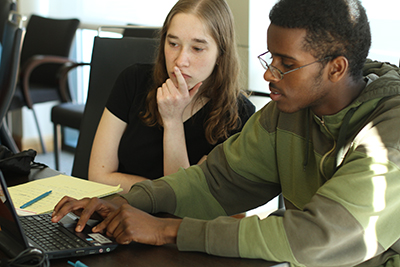 April 8-9, 2013
April 8-9, 2013
Landmark College
Putney, Vermont
Multiple activities to increase the participation of students with
disabilities, including veterans, in computing and information technology (IT) postsecondary education and career fields are coordinated by the Alliance for Access to Computing Careers (NSF AccessComputing). NSF AccessComputing is led by the Department of Computer Science and Engineering and the DO-IT (Disabilities, Opportunities, Internetworking, and Technology) Center at the University of Washington (UW) and is funded by the Computer and Information Science and Education (CISE) program of the National Science Foundation (#CNS-1042260).
This publication shares the proceedings of Pathways to Success for Students with Invisible Disabilities, an NSF AccessComputing-sponsored CBI that was held at Landmark College on April 8–9, 2013. The content may be useful for people who:
- participated in the CBI
- are on the local project teams of NSF AccessComputing institutional partners
- want guidance for conducting a CBI at their institution, in their region, or at a national or international forum
- seek to increase their understanding of issues surrounding the participation of students, including veterans, with invisible disabilities in computing and IT studies and careers
- are motivated to engage in an electronic community to discuss these issues
- would like to access resources to help them make their campus courses, services, and activities more welcoming and accessible to students with invisible disabilities
- have promising practices to share with others.
About NSF AccessComputing
NSF AccessComputing works to increase the participation of people with disabilities in computing and IT fields. NSF AccessComputing institutional and organizational partners apply evidence-based practices to:
- increase the number of students with disabilities successfully pursuing degrees and careers in computing fields
- increase the capacity of postsecondary computing departments to fully include students with disabilities in computing courses and programs
- create a nationwide resource to help students with disabilities pursue computing fields
- help computing educators and employers, professional organizations, and other stakeholders develop more inclusive programs and share effective practices nationwide
NSF AccessComputing institutional partners are Auburn University, Carnegie Mellon, City University of New York (Queen's College), Clemson University, Gallaudet University, Georgia Institute of Technology, Landmark College, New Mexico State University, North Carolina State University, Portland State University, Rochester Institute of Technology, Southern Illinois University Edwardsville, Towson University, University of Colorado Boulder, University of Maryland Baltimore County, University of Rochester, and Washington State University.
NSF AccessComputing organizational partners are Advancing Robotics Technology for Societal Impact (ARTSI); the Alliance for Students with Disabilities in Science, Technology, Engineering, and Mathematics (AccessSTEM); Caribbean Computing Center for Excellence (CCCE); Center for Minorities and People with Disabilities in Information Technology (CMD‐IT); Commonwealth Alliance for Information Technology Education (CAITE); Computing Alliance of Hispanic‐Serving Institutions (CAHSI); East Alliance for Students with Disabilities in STEM; Empowering Leadership Alliance (ELA); Georgia Computes; Into the Loop; National Center for Women & Information Technology (NCWIT); National Girls Collaborative Project (NGCP); Reaching the Pinnacle (RTP); STARS Alliance; Virtual Alliance for Deaf and Hard of Hearing in STEM; Expanding Computing Education Pathways (ECEP), and Institute for African American Mentoring in Computing Sciences (iAAMCS).
NSF AccessComputing collaborates with project partners by:
- conducting CBIs focused on increasing the participation of students with disabilities in computing and IT academic programs and careers
- sharing the results of the CBIs with other institutions and individuals who serve students with disabilities
- providing an electronic forum to continue discussion of issues for students, including veterans, with disabilities and increase services and supports for these students
- extending resources to other programs and promising practices via an online searchable Knowledge Base